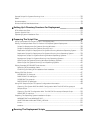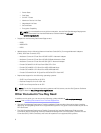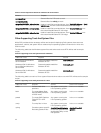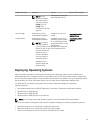
You can install the DTK Linux RPM utilities on the following operating systems:
• Red Hat Enterprise Linux 6.5 (64-bit)
• Red Hat Enterprise Linux 5.9 (64-bit and 32-bit)
• SUSE Linux Enterprise Server 11 SP3 (64-bit)
NOTE: The RPMs are available in the RPMs folder of DTK ELI ISO, at linux.dell.com/repo/hardware,
and also in the Dell Systems Management Tools and Documentation DVD.
Supported BIOS Firmware Versions
The latest (n) version or the n-1 version of BIOS firmware that is available at support.dell.com.
Prerequisites And Requirements
The prerequisites and requirements to run DTK utilities are as given below.
NOTE: The target system must not have Fibre Channel (FC) devices.
See Also:
• Installation Prerequisites
• Deployment Prerequisites
Installation Prerequisites
Before installing the DTK components for Windows PE, ensure that you have the following:
• The DTK self-extracting zip file (DTKX.X-WINPE-XX.exe), which contains the utilities, sample scripts,
sample configuration files, and documentation to deploy your Dell system.
• A Windows workstation or server that has 512 MB of RAM.
Before installing DTK components for embedded Linux, ensure that you have the following:
• The DTK ISO image, which contains the utilities, sample scripts, sample configuration files, RPMs, and
documentation to deploy your Dell system.
NOTE: The DTK ISO contains two bootloaders (isolinux for BIOS mode and grub2 for UEFI
mode).
• A Linux workstation that has at least 200 MB of free hard-drive space.
Deployment Prerequisites
Before beginning the deployment process for Windows PE, ensure that you have all of the following
tools, software, and information ready to use or consult:
• Windows Automated Installation Kit (AIK) for Windows Server 2008 R2 to build Windows PE 3.0.
• Windows Assessment and Deployment Kit (ADK) for Windows Server 2012 and Windows Server 2008
to build Windows PE 4.0.
• Windows Assessment and Deployment Kit (ADK) for Windows Server 2012 R2 to build Windows PE
5.0.
• An unzip utility.
• Working knowledge to build Windows PE 3.0, Windows PE 4.0, and Windows PE 5.0 (see the
Microsoft documentation to customize Windows PE).
12


















